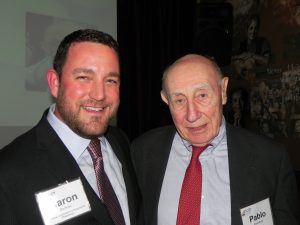I remember when I first met Pablo.
It was the fall of 2006. I had flown up to DC to interview for the job of executive director of NCRP. Pablo was on the search committee.
 I had known of Pablo for many years before I actually met him. When I was a young organizer working for ACORN, I knew about Pablo and his incredible work at the Center for Community Change. As a student at what is now the Lilly Family School of Philanthropy at Indiana University, I had read his writings about philanthropy. But I had never met him in person.
I had known of Pablo for many years before I actually met him. When I was a young organizer working for ACORN, I knew about Pablo and his incredible work at the Center for Community Change. As a student at what is now the Lilly Family School of Philanthropy at Indiana University, I had read his writings about philanthropy. But I had never met him in person.
Also on the search committee were luminaries like David Jones, Gary Bass, Diane Feeney and others. And as we sat around that conference table, engaging in a robust conversation about what it would really take to transform philanthropy, I had no idea how much Pablo Eisenberg would be in my head for the next 16 years.
Pablo’s Lasting Impact
Pablo was one of the founders of NCRP, as you all know. In the years leading up to that founding in 1976, Pablo, along with Jim Abernathy, Thomas Asher and others nonprofit leaders, formed something called the Donee Group.
There was a blue-ribbon commission meeting at that time, the Filer Commission, that was looking into how philanthropy could best serve society. And the Filer Commission kept calling for testimony from wealthy donors and the people who led the largest foundations in the country. Pablo and his colleagues knew the commission was only getting part of the story. They weren’t hearing from the nonprofits that serve and represent Americans who had been marginalized or oppressed. They formed the Donee Group to be the voice of grantees (donees) to the Filer Commission.
After several years operating as an unincorporated coalition, they realized that philanthropy would always have blind spots. They decided to form NCRP to be an ongoing voice that could hold philanthropy accountable to those with the least wealth, power, and opportunity in our society.
Pablo was the first chair of the board of NCRP, and he served on the board for 37 continuous years after the organization’s founding. He played a key role shaping campaigns that have made philanthropy more responsive and accountable.
The early campaigns focused on transparency, blasting foundations for not sharing information about their grantmaking and operations. Many funders began publishing annual reports in response to NCRP’s work. And Pablo and NCRP helped secure changes to the 990PF tax forms that foundations file with the IRS, making sure those tax filings included important and relevant information.
In the 1990s, the organization published hard hitting reports about the lack of community foundation support for people of color and for advocacy. Many of those foundations improved after the criticism and after being confronted by local nonprofit leaders.
Pablo also successfully helped NCRP pressure workplace giving programs like the United Way and the Combined Federal Campaign to be more inclusive of communities of color, and to be bolder by funding efforts for systemic change, not just for direct service.
When we were developing Criteria for Philanthropy at Its Best in 2008 and 2009, Pablo played a key role.
Continuing Pablo’s Legacy
One of Pablo’s greatest desires was for leaders of grantee organizations to stop being so deferential to funders. So, to encourage this kind of bold behavior and truth-telling, NCRP is establishing the Pablo Eisenberg Memorial Prize for Philanthropy Criticism. The prize will acknowledge and shine a spotlight on those who are speaking truth to power. We’ll share more details about the prize early next year.
The prize is just one way we’ll carry on Pablo’s legacy. Another way his legacy will live on is his impact on all of us who knew him and were moved by him.
I said earlier that I had no idea back in 2006 how much Pablo would be inside my head. For the past 16 years, whenever I had a hard decision to make, Pablo has been there, in my head.
Am I being bold enough?
Am I bringing just the right critique?
I am comforted today knowing that Pablo will be with me, inside my head, for many years to come.
Click here to learn more about how to financially support Pablo’s legacy. As mentioned above, donations made in Pablo’s name through December 31st will go to establishing a memorial prize in philanthropic criticism and providing general operating support for NCRP’s ongoing efforts to make philanthropy more transparent and accountable to the communities we all serve.














































































































































































































































































































































































































Leave a Reply